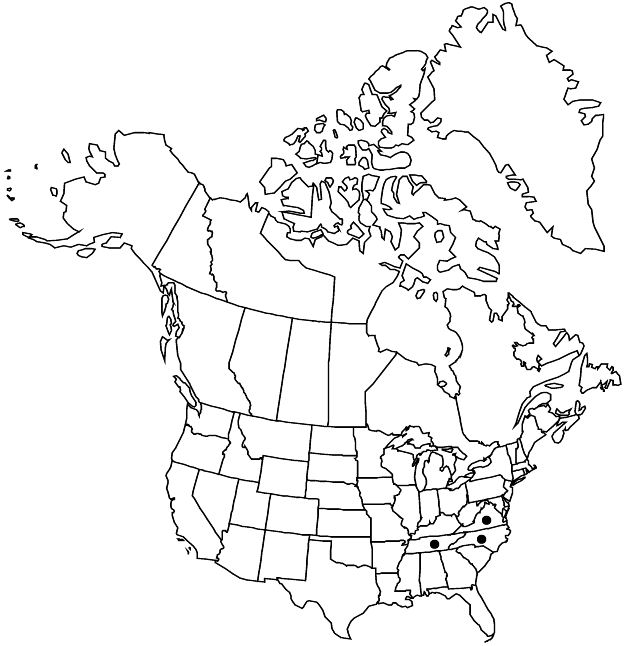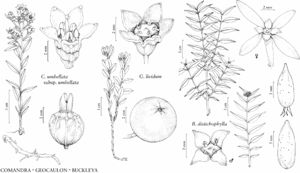Buckleya distichophylla
Amer. J. Sci. Arts 45: 170. 1843.
Shrubs, rhizomatous, to 3–4 m. Bark light-brown, smooth, with white lenticels. Stems green, terete to slightly 4-angled when young, puberulent; growth sympodial, terminal bud sometimes aborting giving false appearance of dichotomous branching. Leaves: petiole short or absent; blade lanceolate or ovatelanceolate, to elliptic near base of branchlet, 1.2–9 × 0.3–2.9 cm distally, progressively smaller proximally, thin, base cuneate, margins entire, apex attenuate, surfaces puberulent especially on margins and midvein. Inflorescences terminal. Pedicels: staminate 1–4.2 mm. Staminate flowers: petals greenish, 1.2–2.5 × 1.1–2 mm, puberulent; nectary 1–1.8 mm diam. Pistillate flowers: sepals greenish, narrowly elliptic to lanceolate, 3–17 × 1–3 mm, apex acuminate, puberulent, venation conspicuously pinnate-reticulate; petals greenish, triangular, 1.3–3 mm × 1–22 mm, puberulent; ovary narrowly conic, 3.4–15 mm, puberulent; styles 0.7–1.6 mm. Pseudodrupes ellipsoid to obovoid, 0.9–3 × 0.4–1.7 cm, puberulent, with small whitish lenticels. 2n = 30.
Phenology: Flowering Apr–May, Aug.
Habitat: Dry rocky or shaly outcrops and river bluffs.
Elevation: 500–1000 m.
Distribution

N.C., Tenn., Va.
Discussion
Buckleya distichophylla is an uncommon shrub in the southern Appalachian Blue Ridge Mountains and adjacent Ridge and Valley region; the reason for its rarity is not understood. One hypothesis is that the plants require both direct sunlight and hemlock (Tsuga canadensis) hosts, a rare combination of conditions (A. E. Radford et al. 1968). But other explanations are called for because Buckleya is found in stands lacking hemlock (W. N. Carvell and W. H. Eshbaugh 1982). Moreover, pot-grown plants showed seedling parasitism of 19 different tree species (L. J. Musselman and W. F. J. Mann 1979b); these authors suggested that Buckleya requires a distinctive habitat where hemlock happens to be dominant.
Buckleya distichophylla is in the Center for Plant Conservation's National Collection of Endangered Plants. It is not Federally listed, but three states (North Carolina, Tennessee, Virginia) list it as threatened or endangered.
Selected References
None.
Lower Taxa
"thin" is not a number.
